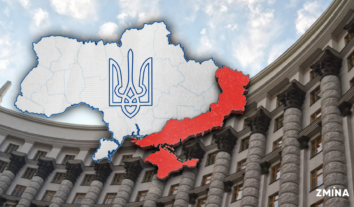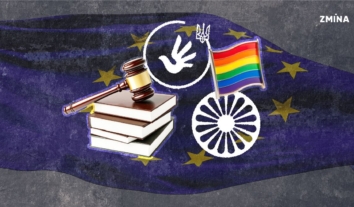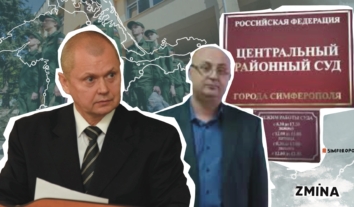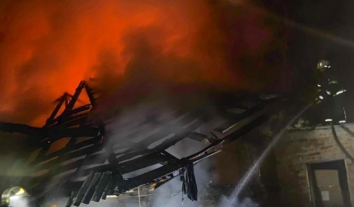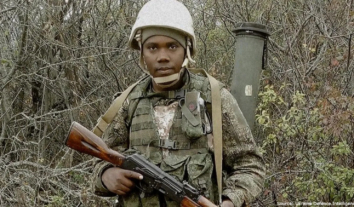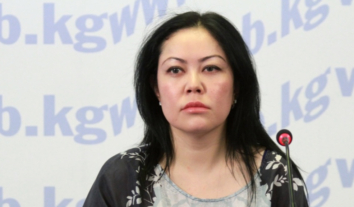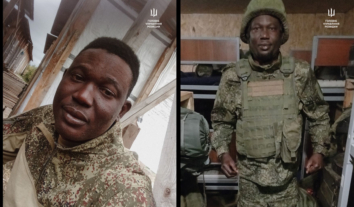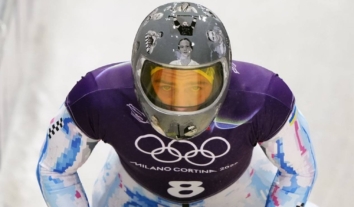Yulia Resenchuk. Fancy destroyer of stereotypes
#FeelYourRights
December 3 – International Day of Persons with Disabilities
Haven’t you made friends with her on Facebook yet? Haven’t you asked her for an autograph yet? Haven’t you recognized her in the street yet? You’re welcome to meet Yulia Resenchuk, a girl who makes a revolution in changing our attitude to people with disabilities.

Yulia proves every day that a girl with a disability can be a successful business woman, chair a charitable foundation, be a model at a fashion show, took part in star photo shoots, be a beloved wife, and inspire to new ideas.
A car accident in 2006 made a sharp turn in life of Yulia. The girl had to learn how to do basic things again – how to dress, take a shower, go outside without fear. However, a wheelchair has become just necessary means to move, not an obstacle to explore the world for her.
Yulia is more than just a girl in a wheelchair. Make sure for yourself.
Breaking stereotype No.1. Persons with disabilities are useful to society
– Yulia, what was the turning point after a car accident in your life?
I got much time to stay alone with myself, to think about everything – analyze my life, make some conclusions, reappraise the values. That was, probably, the first thing I did after the accident.
Second, I had the support of my friends who had no left me and were always by my side. I have spoken a lot with people with a diagnosis similar to mine. Many of them say that they have lost friends after the injury. I can say that I am a happy person having such friends.
Third, I started to learn how to do basic things again. Just like a child who just begins crawling. First, I learn how to sit in a wheelchair on my own. Then, how to take a shower, get dressed on my own… I had to learn again how to do such common things to all people. And it was so difficult to take the first step outside, to the open world…
And finally, I wanted to be useful. I wanted to be useful to my family, my country, people. These four points have, probably, led me to who I am now, what I am doing now, how I live now.
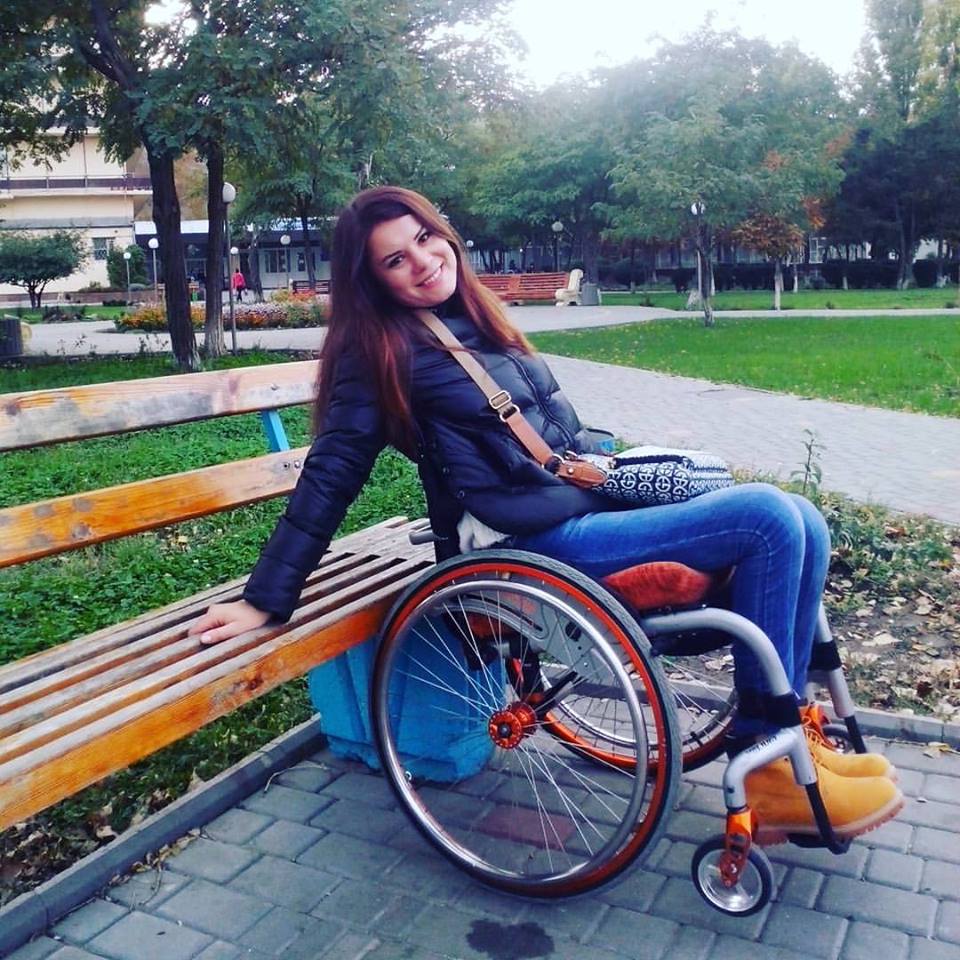
Breaking stereotype No.2. Persons with disabilities are competitive in labor market
– Now you chair Charitable Foundation “AIK”, which helps persons with complex disabilities to socialize. You have chosen education among all the areas. What was the reason for your choice?
Self-fulfillment is important for all people, regardless of whether they have disability or not.
If persons with disability have not found their place in life, they are unlikely to feel happy no matter how much charitable assistance is provided to them. You often surrender yourself to despair because of the fact you cannot be useful to society, to fulfill yourself, to support your family… So, our organization is focused on help to get an education and to find a job.
Amidst our barrier environment it is difficult to say now that persons with disabilities can be competitive in the labor market on an equal basis with others. Therefore, we deliberately chose the IT sector offering possibilities to study remotely and make good money. Our clients are mostly those who have disabilities of the first and the second groups. There are many people among them who cannot even go outside.
We have good stories, when people in tough physical condition work successfully, earn money… However, the most important thing is that they are busy, they have a favorite job.
I always say: do not give fish, give a rod and teach how to catch fish. It is very important not to do something instead of people with disabilities (and not only), but create opportunities so that they could earn money on their own.
– I agree with you. For example, for me it’s important to be independent and socially active…
When I was a student, before the accident, I was far from social topics, though … I studied at the University “Ukraine” to obtain the qualification of a social worker. By the way, it is the only educational institution, accessible for a person with disability. I do not know whether it is fate or coincidence but I was able to return to my studies.
However, now I observe just “crazy” social activity. It is especially evident after the Maidan events. And it’s very cool! There is hope that we still strive to Europe.
– Have the persons with disabilities become more active?
I think yes, they have. I see young people, who are like engines, who are ready to break the wall. Others take a pattern by them. For a leader, it is important to pave the way not only for himself/herself, but for others as well. I meet a lot of young wheelchair users with a new view of the world. I have recently met model Oleksandra Kutas. She’s very young, but she has such a progressive outlook on life! I know that she will achieve a lot.
I also have another friend, Maria Nikitina from Chernivtsi, who ran in local elections. When she was being photographed for election poster for billboards, she gave up a wheelchair. When asked what the reason was, Maria replied, “I do not want to be perceived only as a disabled person. I don’t want people to elect me just because I’m a wheelchair user. I want to be perceived as an experienced professional, who could really change something in the community...”
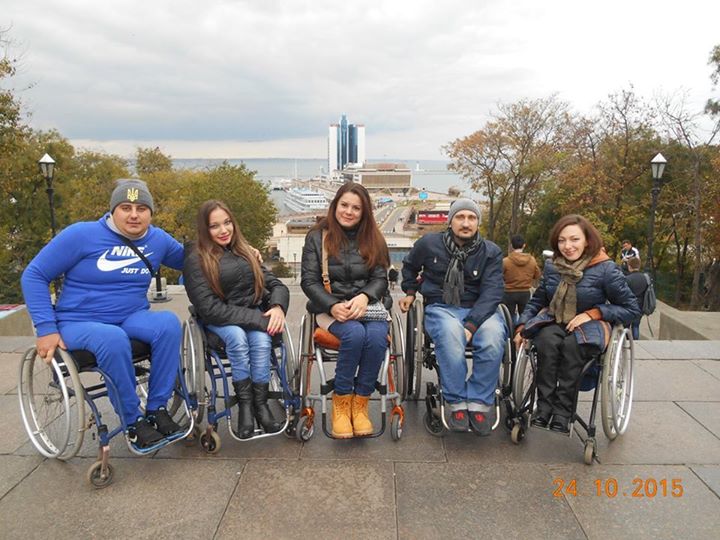
Breaking stereotype No.3. Persons with disabilities are independent
– According to various studies, women with disabilities face discrimination much more often than men do. Have you experienced discrimination as a woman with a disability, as a beautiful woman, as a young woman?
You know, I am much more depressed with discrimination at the local level. For example, I am looking where I can park my car and I see that a place for a person with disabilities is already occupied! And when I come to a driver and ask why he/she has occupied this place, I hear screams instead of apologies. Such things bother and disturb me very much.
Another challenge is medical field. Usually I go to clinic with my mother. Not because I need some kind of “special” help, she is just my best friend and it’s not so boring to wait in line with her. And when it’s my turn to see a doctor, I hear, “Mother, come in, too”. And when doctors talk about my state of health, they often address my mother, not me as a patient. “Please, tell everything to me. I can hear you well, I understand everything, I’m not a baby….” Unfortunately, health workers often divide people into the diagnoses. And it’s difficult to see…
Breaking stereotype No.4. Persons with disabilities fall in love and get married

– Who is Yulia out of work and social life? How do you like to have a rest?
I and my husband Vadym love traveling. We have already been to Paris and Brussels, discovered Spain and the United States…
We have a lot of friends, so we can go together to the movies or meet in a cafe. And sometimes I just want to stay home. Life is full of events and emotions and sometimes I get tired of the intense rhythm.
– Let’s add a little romance to our conversation. How did you meet your husband?
We met thanks to the foundation, which I chair. He is the co-founder of the AІK. The foundation was earlier chaired by Yevhen and Serhiy. The boys had a severe disability of muscle weakness. But in spite of a disability, Yevhen and Serhiy together with my future husband Vadym set up a non-governmental organization that helps other people with disabilities. The guys put heart into this foundation.
… When Yevhen died, Vadym promised at his funeral that he wouldn’t leave the foundation and would find a worthy replacement. Vadym was looking for such a replacement. In 2009, he offered me and Natalia Kruk chairing the foundation.
At that time I was a volunteer at another NGO. Vadym noticed at some event. So we met. Then we worked together a lot, Vadym patiently acquainted me with the activities of the foundation, he taught me a lot. Later, we became friends and started to see each other more often after the work. We had the opportunity to go together to Paris in one of our trips. And there, at the Eiffel Tower, Vadym offered me being his girlfriend, he said that he liked me…
– Did you guess that before?
Of course, I guessed. I saw him dancing around me, he just did not dare to admit…
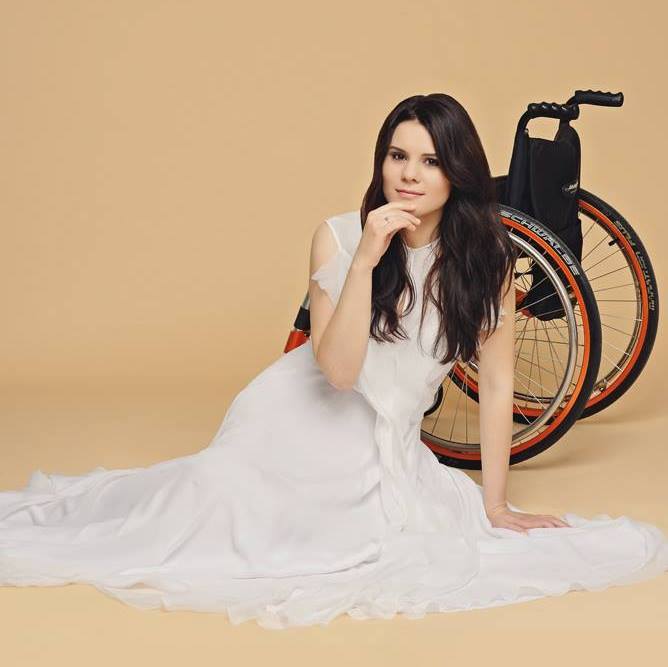
Breaking stereotype No.5. Persons with disabilities are pushful and socially active
– Yulia, tell us about your parents, please. I think that an accident was a trial for them, too.
I want to tell about my mother, my father died. I have a stepfather, but we have never been particularly close with him. So, my mother is the closest person to me. Of course, it was not easy for her to go through the accident and rehabilitation when I was lying helplessly… She has helped me a lot. I’m very grateful to her.
One time I had to fight with her for my independence. It’s typical of my mom to say, “Do nothing, lie, I’ll do everything by myself…” And I realized that I needed to be busy with something. If I am just lying, nothing good will come of it.
One day my mother went on business and called me, “Yulia lie, have a rest. I’ll be back and we’ll go to the bathroom...” Let me say as it is – I needed help even to wash myself. So when she was going outside, I used it as an opportunity to learn everything myself.
I remember a bright moment: Mom enters the room and says almost at the door, “Take off clothes…” And I’m sitting and drying my hair already. She was so surprised, “How could you do that?“
Since then, I tried to seek help less so that she could feel freer, too.
Today, of course, my mother is proud of me. She participates in all my projects and activities. I say that my mother is our main volunteer. All my friends know and love her. She is their friend, too. I also feel proud of her. She is also a very beautiful woman.
– You’ve told that you had to learn how to do some things anew as a child. Hasn’t your home become a main obstacle for you?
I was living in the apartment of parents after the accident, and it was very difficult. We lived on the fourth floor of a building without an elevator. Every time I had to ask someone for taking me up or down… There were cases when I returned home late at night by taxi and realized I had nobody to ask as everyone were already asleep. And having arrived, I asked a driver, “I’m sorry, could you help me, otherwise I’ll sleep on the street…“
The drivers helped me. But we knew that it couldn’t be so all the time. However, the stairs have not stopped me. I learned how to go upstairs and downstairs in the camp of active rehabilitation “GAR”
I learned about the possibility to get social housing. I and my friends just heaped the letters upon the Kyiv City State Administration and they had no choice but to invite me to a meeting to see a girl, so many people were asking for.
As far as I know, there are just three social residential buildings in Kyiv. They are called so because the apartments are given to veterans, single people, persons with disabilities… The peculiarity is that such apartments have much wider doors, more spacious corridors, an elevator, and free passage to the elevator at the first floor.
I and my husband live in this apartment now. It is not my private property. When we are able to buy our own apartment, we will return it.
Other few words about accessibility. You know, I always say that it is not necessary to do something global. It is important that people with disabilities change the world around them – the entrances to the nearest store, pharmacy, park. It is important that everyone is able to manage to make these places accessible and comfortable. It is not so difficult.
There is a pharmacy not far from our house. It had just a terrible ramp! It was nonsense: the stairs, and only then … a call button. Finally, I decided to talk with the director of the pharmacy. It happened so that she broke her leg at that time… The woman understood me and my request. You know, she did what I asked for without long talks. Now I can enter the pharmacy by myself.
If everyone does something alike, we will soon have the accessible world, which we dream so about.
Breaking stereotype No.6. Persons with disabilities are interesting interlocutors
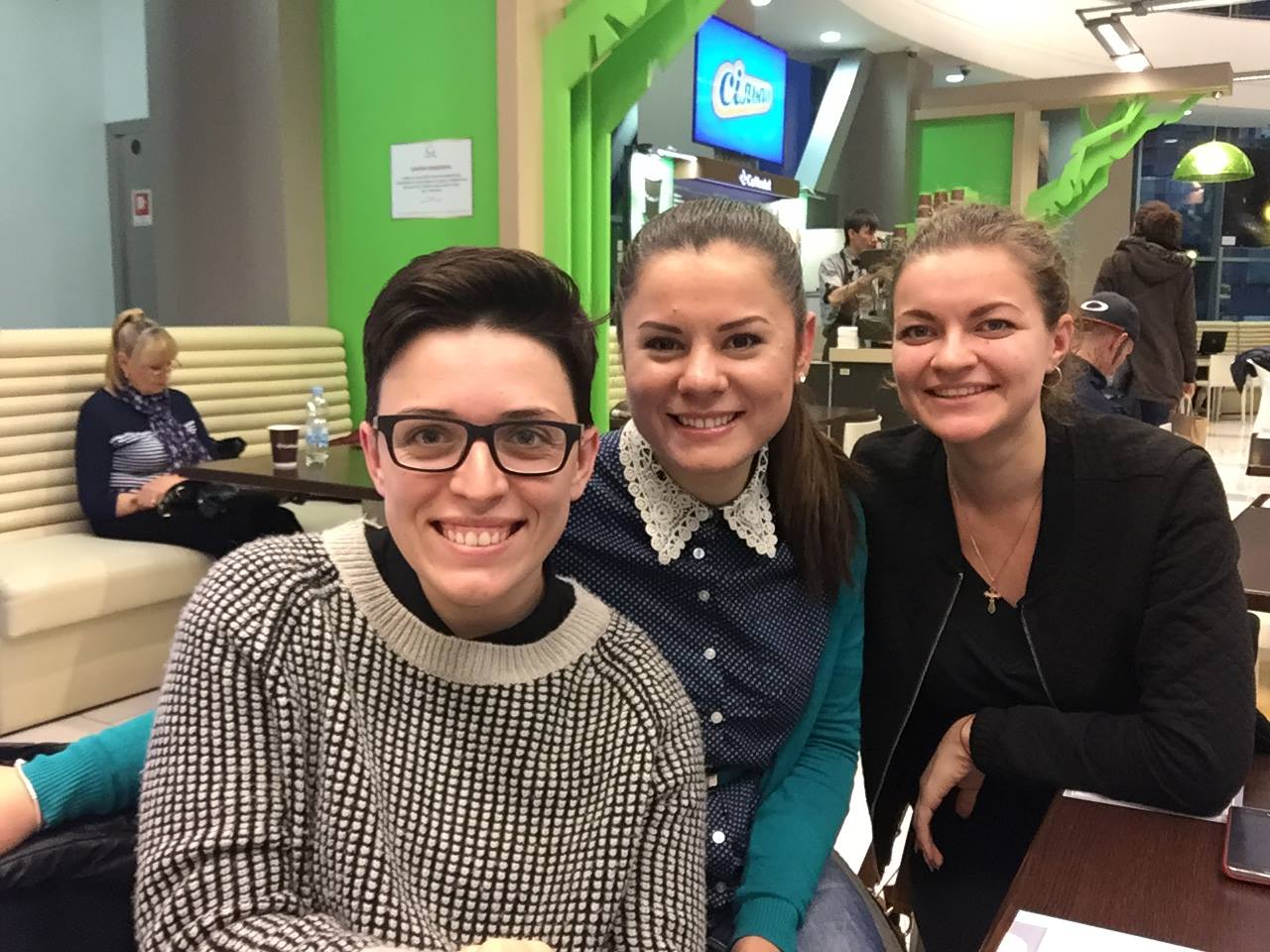
– You often go abroad. Do you feel the difference in the service, or when you just walk down the streets, use transport? I’m more interested in the reaction of people, not the architectural accessibility.
Forgive me for being rude, but our people are still “wild.” Now I try not to notice this. Although sometimes they look at me as if I were from another planet. I have never felt it abroad, especially in the United States. These are bad manners if someone starts to react at a different skin color, physical characteristics, and so on.
Second, there have already got accustomed to the otherness, the persons with disabilities are the visible part of society. I met someone with a disability every day: either they buy something in the store, or relax in the cafe, or just walk around…
Our people have not yet got used to it. Often, the Ukrainians with disabilities do not want to go out because of this hostility, being afraid that other will look “wrong” at them. And I was afraid of that, too. When I went outside for the first time after the accident, I put my sunglasses on. I thought that all the passengers of the trolley looked at me through the windows. I did not want that pity on me. It bothered me very much…
Now I’m more tolerant to such “attention.” Maybe, they just have never seen a girl in a wheelchair, it is interesting… Especially the children, they come running, ask something. And it often depends on parents how they will tell their children why a girl is moving in a wheelchair. For example, they may say that she was broken like a puppet. You know, you can always find the words to explain.
 The worst thing is when the moms say fearfully, “Do not look!” and close the eyes of their children, worrying not to traumatize their son or daughter. However, it is this reaction which can hurt a child even more. Sooner or later, the child will encounter someone with a disability, but such people will fear him.
The worst thing is when the moms say fearfully, “Do not look!” and close the eyes of their children, worrying not to traumatize their son or daughter. However, it is this reaction which can hurt a child even more. Sooner or later, the child will encounter someone with a disability, but such people will fear him.
Breaking stereotype No.7. Persons with disabilities are successful
My advice is simple: do not hide from the world, do not be afraid. We have nothing to lose. And it is better to take a risk than to sit at home, and… not to live, you may say. Love life, go somewhere, be interested in something, do something useful – and you will live then.
Photos taken from Yulia’s family archive


